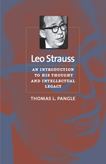• Home | • Curriculum Vitae: » PDF | • Return to Books & DVD


Leo Strauss:
An Introduction to His Thought and Intellectual Legacy
An Introduction to His Thought and Intellectual Legacy
The Johns Hopkins University Press, 2006
Leo Strauss's controversial writings have long exercised a profound subterranean cultural influence. Now their impact is emerging more and more into broad daylight. In reaction, there has been a flurry of poorly informed, often wildly speculative, and sometimes rather paranoid pronouncements about the subversive or dangerous things that Strauss or those influenced by him are supposed to think and to teach.
This book, written in response and as a corrective, is the first accurate, non-polemical, brief, and yet comprehensive guide to Strauss's mature political philosophy and its intellectual influence. It does not presuppose any familiarity with Strauss's writings, but opens a pathway into Strauss's major works, approached in the light of the question: how does Strauss's philosophic thinking contribute to our democracy's civic renewal, and to our culture's deepening of critical self-understanding?
A leading and distinctive feature of this book is its synoptic critical survey of writings by numerous scholars who have extended Strauss's influence into the more practical, sub-philosophic fields of social and political science and commentary. The book shows how these analysts have in effect implemented a "new" kind of political and social science that, inspired by Strauss, has taken his impulse into large areas in which Strauss himself did not directly venture.
This book, written in response and as a corrective, is the first accurate, non-polemical, brief, and yet comprehensive guide to Strauss's mature political philosophy and its intellectual influence. It does not presuppose any familiarity with Strauss's writings, but opens a pathway into Strauss's major works, approached in the light of the question: how does Strauss's philosophic thinking contribute to our democracy's civic renewal, and to our culture's deepening of critical self-understanding?
A leading and distinctive feature of this book is its synoptic critical survey of writings by numerous scholars who have extended Strauss's influence into the more practical, sub-philosophic fields of social and political science and commentary. The book shows how these analysts have in effect implemented a "new" kind of political and social science that, inspired by Strauss, has taken his impulse into large areas in which Strauss himself did not directly venture.
In Pangle's words, Strauss instilled "a tempered appreciation for the nobility of the political life within liberal democracy as the best regime possible in our epoch, in full awareness of this democracy's and that epoch's intensifying spiritual and civic conundrums." We are not surprised, then, to find that one of Pangle's earlier books is entitled The Ennobling of Democracy: The Challenge of the Postmodern Age.
This tempered appreciation, this ennobling, means real engagement with the nitty-gritty of our government. And Pangle provides an absolutely indispensable tour through the various connecting points Straussians have made to the particularities of the American regime,everything from a massive resuscitation of the study of our founders, to monographs focusing on federal regulations, voting studies, the fight against poverty, race relations, judicial theory and practice, agricultural policies, national defense, the nature of the presidency, economic theory, and the list goes on. Pangle's bibliography at the end is alone worth the price of the book.
This tempered appreciation, this ennobling, means real engagement with the nitty-gritty of our government. And Pangle provides an absolutely indispensable tour through the various connecting points Straussians have made to the particularities of the American regime,everything from a massive resuscitation of the study of our founders, to monographs focusing on federal regulations, voting studies, the fight against poverty, race relations, judicial theory and practice, agricultural policies, national defense, the nature of the presidency, economic theory, and the list goes on. Pangle's bibliography at the end is alone worth the price of the book.
-Crisis Magazine
L’un des straussiens les plus éminents nous propose une vue d’ensemble de l’oeuvre et de la postérité intellectuelle de Leo Strauss dans son Introduction to his Thought and Intellectual Legacy. Tâche difficile, compte tenu de l’étendue de l’horizon intellectuel que fut celui de Strauss, ce penseur pour qui l’intérêt pour les sujets actuels de science politique s’est traduit par un intérêt vivant pour la pensée ancienne. En lisant cet ouvrage plutôt succinct, on devient sensible à l’intention de l’auteur, qui apparaît moins comme un effort pour suivre les sentiers de la réflexion straussienne de façon exhaustive – impossible pour une « introduction » – que comme une mise en relief claire et concise de ce qu’il considère être les questions, les tensions, les problèmes essentiels que Strauss s’efforça d’éclairer. Sa démarche a comme but, d’une part, de corriger certaines idées fausses concernant la pensée etl’influence de Strauss qui se sont propagées dans les médias et, d’autre part, d’éveiller un intérêt réfléchi chez le lecteur. En effet, la présentation lapidaire des thèses principales de Strauss incite à la découverte plus approfondie de ses oeuvres.
-Commentaire
A compact, elegant, learned, often incisive, and, we gather, intentionally puzzling introduction to the master's thought.
-Political Science Reviewer

